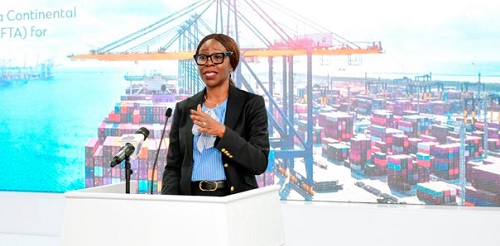
Stanchart projects $1tn Africa exports by 2035
The Standard Chartered Bank has projected that Africa’s total exports would reach $1 trillion by 2035, with a potential 29 per cent increase after the full implementation of the African Continental Free Trade Area (AfCFTA).
This was revealed at the launch of a comprehensive report on the AfCFTA to empower businesses and stakeholders to take advantage of the opportunities under the agreement.
Dubbed “Future of Trade, Africa” - the report highlights the outlook for African trade and provides a view of AfCFTA as a key proponent of optimising intra-African trade.
At the bank’s first business forum for 2024 in Accra last Tuesday, the Chief Executive of Standard Chartered Bank Ghana PLC, Mansa Nettey, stated that the report was designed based on in-depth research, a survey of business leaders across the continent, expert analyses on key policies and major opportunities.
She said the report sought to establish a clear perspective on how to enable African economies to develop a solid manufacturing sector, while avoiding the commodity trap through value chain formation and value addition for the local, regional and global export markets.
She said the new report was a good reference because it laid out key recommendations for navigating the challenges associated with the single market initiative.
Report highlight
Touching on the highlight of the report, Mrs Nettey noted that by 2035 total African exports would reach $1 trillion, but a well implemented AfCFTA could boost the figure by 29 percent.
She said rising regional trade levels and greater connectivity would unlock high growth corridors across Africa and beyond.
Intra-African exports, which were forecast to reach $140 billion in 2035, could be boosted by an additional 81 per cent as a result of AfCFTA.
“Rising regional trade levels and greater connectivity would unlock high growth corridors on the continent with intra East Africa growing by 15.1 per cent; intra West Africa increasing by 13.2 per cent, and Central Africa rising by 12.9 per cent.
“We believe that certain critical measures such as governance, cooperation and investment in cross-border infrastructure development, trade facilitation measures, as well as financial infrastructure, must be put in place,” she said.
Progress so far
The National Coordinator at the (Ghana) National AfCFTA Coordination Office, Dr Fareed Kwasi Arthur, stated that the National Coordination Office had been assisting businesses to start trading under AfCFTA in the last three years.
“We have worked with the AfCFTA Secretariat to set up the guided trade initiative which seeks to allow commercially meaningful trading and test the operational, institutional, legal and trade policy environment under the AfCFTA.
“The guided trade which was started originally by seven countries has now increased to 27 countries.
This is the experimental period for commercially viable trading and it is expected to help identify the bottlenecks in intra-African trade,” he said.
Strategic advantage
A Senior Partner of AB & David Law Firm, David Ofosu-Dorte, stated that the country should refocus on building a strong strategic advantage under the AfCFTA initiative.
That, he said, would help the country and its firms to maximise gains and grow the export market.
“I think what the country should be doing is to look at what constitutes our strategic advantages so that we can leverage for the better; I do not really believe in comparative advantage.
“We must also build the capacity of Ghanaian businesses to be able to lobby the government in order to develop policies that can advance their operations,” he added.
